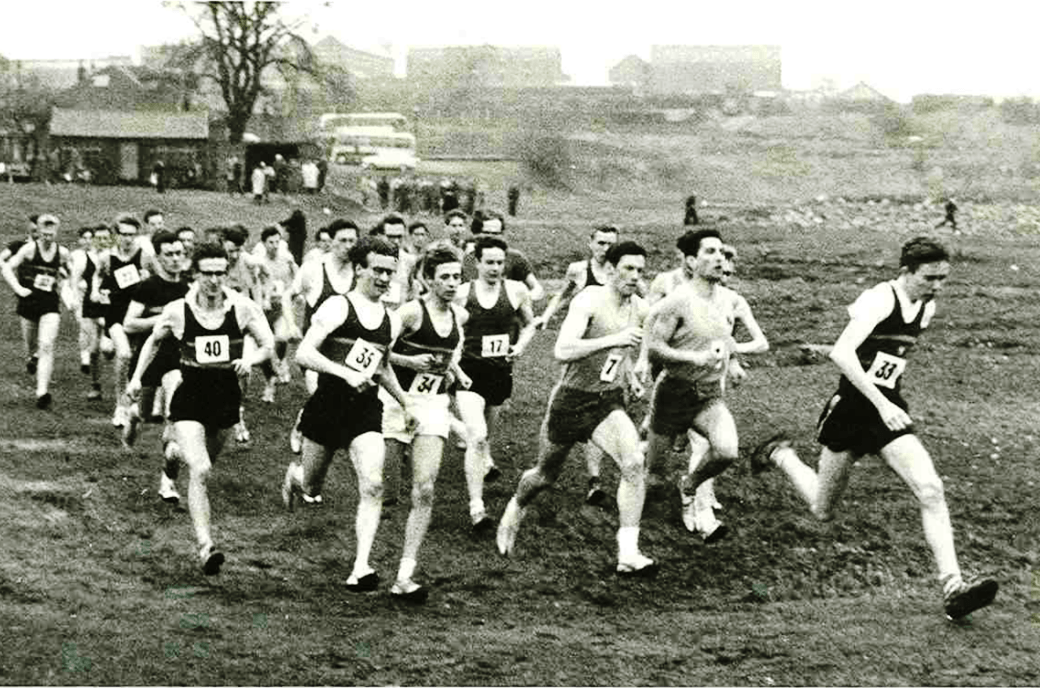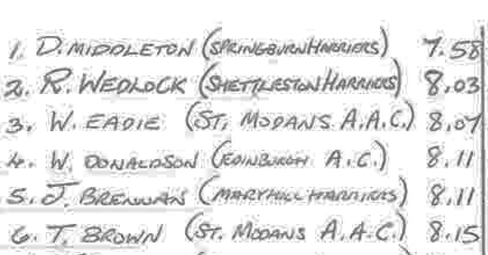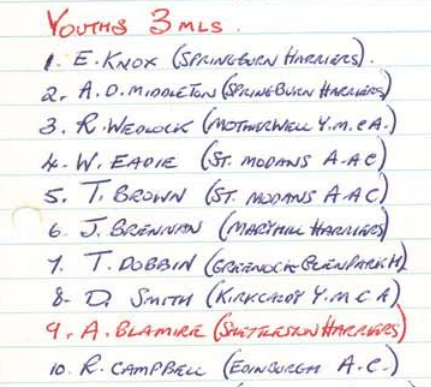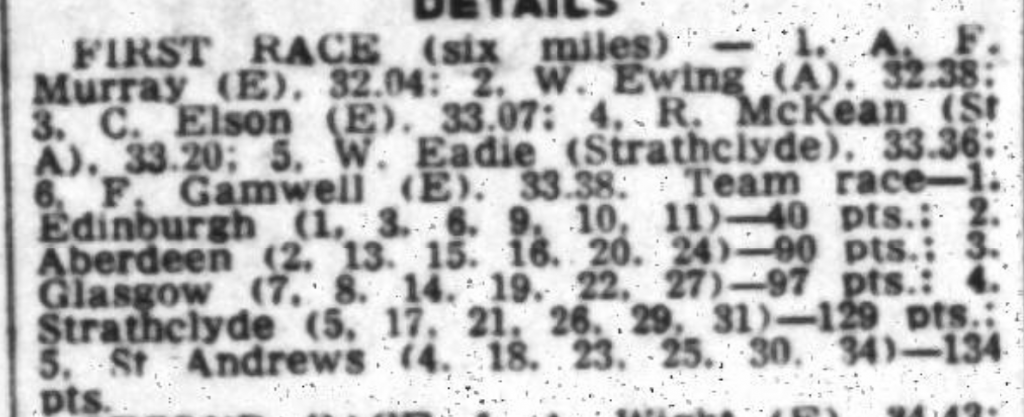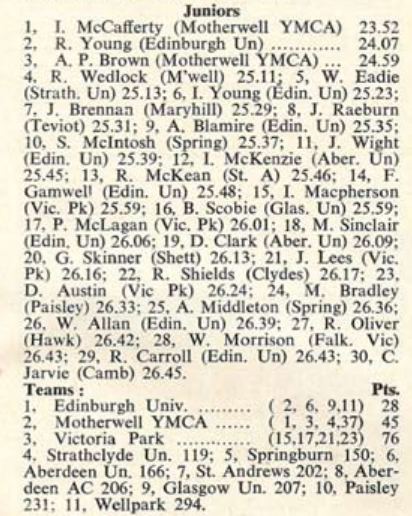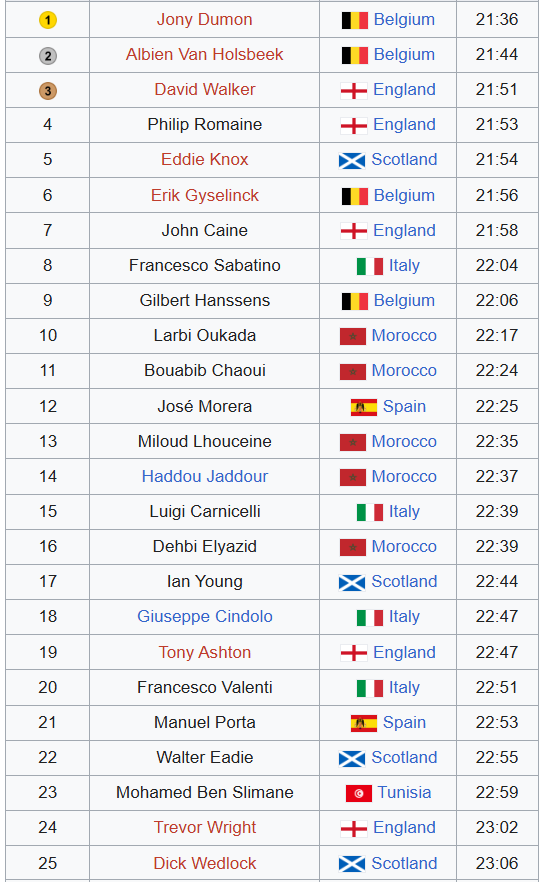Walter Eadie (33) in Strathclyde University colours in Scottish Universities Championship at Cambuslang.
Walter Eadie was a talented runner on the road and over the country and it was a sad loss to Scottish athletics when he emigrated to Canada after graduating from Strathclyde University. He started out with the Stirling club St Modan’s which had been the home club of marathon great Joe McGhee whose victory in the Vancouver Empire Games was never properly recognised or celebrated outside Scotland. St Modans was a good club which catered for more than endurance runners with George McLachlan a GB decathlon internationalist, as well as Mike Ryan who ran for New Zealand in the Olympic Games in Mexico and won a bronze medal for doing so.
We can start by looking at some of Walter’s replies to the questionnaire to find out more about him, his beginnings in the sport and where went from there.
Club/s: St Modan’s AC, Stirling AC, University of Strathclyde
(despite the catholic high school name, St Modan’s was a community club. They later changed the name to Stirling AC to make that clear)
Date of Birth: 3 Oct 1945
Occupation: Product & Marketing Manager, Plastics Industry (Ontario, Canada)
Is there any family background in athletics or any other sports? No
How Did You Get Into The Sport Initially?
I ran x-country for Denny High School in the annual Joe McGhee Trophy race, the Stirlingshire schools championships. I was invited to go to the St Modan’s club by a committee member who saw me run the year I finished 4th. A week later I won the St Modan’s Boys race and a week or so after that finished 3rd in the NCCU Scotland Boys race (March 1962, behind Middleton and Wedlock – our team was 1st).
Personal Bests? Nothing that was remarkable or memorable.
What exactly did you get out of the sport? Success in running gave confidence as the first in my family to go to university. Discipline in training carried over to discipline in studies which resulted in academic success.
Can you describe your general attitude to the sport? I just generally loved running and training. I liked the “Loneliness of the Long Distance Runner” aspect of training but, on the other hand, I still have great memories of the people I trained with and competed with 60 years ago
What goals did you have that were unachieved? I should have run a marathon when I could have, instead of putting it off “until I was really ready”
Can you give some details of your training? Too far in the past to remember much.
When did you head for Canada? Did you do any running when you got there? Have you kept up with the sport?
I left for Kingston Ontario in December 1968, and in 1969 got to know the Queen’s University track coach. I ended up coaching (and training with) the Queen’s cross-country team until 1977. In that time, I represented Ontario in the Canadian championships in Edmonton Alberta. I ran lots of cross-country and road races in that period. After my son was born, I became more involved with football coaching, refereeing and administration. Too many years of road running with poor footwear left me with knees that no longer liked the pavement pounding.
–
Lots to look at there – for instance what he got from running is more than just the travel and friendships but developed confidence which transferred to other spheres of life. That and the associated discipline required to be a successful runner are life lessons to be noted. It is also noted that like several others who emigrated at a relatively young age he continued in the sport in various categories – coach, runner, team member. Having won trophies at St Modan’s, he also made his mark at Strathclyde University as John Myatt says in his own “Strathclyde University Reminiscences” : ” Strathclyde, as a newcomer to university athletics, was developing its own traditions from scratch. Walter Eadie had set the standard in representing Scotland in the Junior International in 1965 while the founding fathers had developed an active social life to complement the running.”
Walter’s first appearance in the National Championships was on 3rd March, 1962 at Hamilton Race course where his third place was a remarkable run for one so young in his first major championship, indeed it was his very first competitive race.. That opening race of his career is noted below
The complete result is available at National XC Results 1961-2 Men.pdf
He had joined a very good team – the St Modan’s Boys team had finished third in the Midland District Championships at Renton in January, less than two months before the National but there was no mention of young Walter, he was not even on the programme. Reason? See above, the SCCU Championships was his first competitive race. The coming of Eadie strengthened an already good squad and St Modan’s AC won the team race with Eadie 3rd, Brown 6th and Fleming 12th, The following year he was up an age group and ran in the Youths (Under 17) age group where he finished eighteenth. Tom Brown was the top St Modan’s runner that year when he finished 5th and the team was also fifth. He had missed the District Championships again although this time he was on the programme.
BY season 1964/65 Walter’s name was appearing in results from all over the country – the success rate was high and many of the athletes beaten were of very high quality. For instance in November 1963 he was in Clydebank for the Youth Ballot Team Race. The race first appeared at the end of the War and was one of the very first open races for the Under 17 age group. The report on the race read:
E Knox (Springburn Harriers) won Clydesdale Harriers open youths two and a half miles road race in the new record of 13 min 51 sec, 2 sec better than the time returned when I McCafferty (Motherwell) won the race last year. Other positions:- 2. W Eadie (St Modan’s) 14:04; 3. AD Middleton (Springburn) 14:05; 4. T Brown (St Modan’s) 14:09; 5. J Brennan (Maryhill) 14:12; 6. C Martin (Dumbarton AC) 14:35. Ballot Team Race:- 1. T Brown 4th, M Bradley 7th, A Johnston (Victoria Park) 16th 27 points; 2. W Eadie 2nd, J Fleming (St Modan’s) 14th, T McEwan (Beith) 21st 37 points.
Look at the names there – Duncan Middleton, Colin Martin, Jim Brennan, Mike Bradley and Alistair Johnstone were all international representatives. The Ballot Team had been originally devised to give every young athlete the opportunity t win a prize even if he were the only one in the age group in his club. Before the start of the race, the names of the entrants were sorted into three piles of equal size with the most successful in the first pile, the least successful in the third pile and the rest in their own. Before the race one athlete from each bundle was picked out at random to make a team of three. At the end of the race, the team with fewest points was the winner.
In January 1964 the District Championships were held on the heavy going and hilly course in Strathleven Estate, Renton, and again it was a superb field in which Walter was sixth in 15:14. The team of Tom Brown (5th 15:12) and Jim Fleming (8th 15:42) was second.
On 1st February , the Inter Counties Championships were held at Cleland Estate, where the first four in the Youths race were: 1. E Knox (Lanarkshire); 2. AD Middleton (Lanarkshire); 3. R Wedlock (Lanarkshire); 4. W Eadie (Stirlingshire). Team Race: 1. Lanarkshire; 2. Midlothian; 3. Dunbartonshire. Another good race on the lead in to the Scottish Championships. These were held on 29th February, 1964; Youths W Eadie 4th 15:18 [E Knox, D Middleton, R Wedlock] Team 2nd (T Brown 5th 15:19, J Fleming 19th, A MacFarlane 31st). First ten listed below:
On the track in 1964 Walter represented the University as he had done over the cross-country season to good effect when won the Scottish Universities 3 miles championship race in 15:07.
In season 1964/65, running in the Junior Men’s age group, he was a student at Strathclyde University which opened up the whole field of University athletics to him as well as having to run in what was probably the toughest County Championships in the country – Lanarkshire. The first really big race that he took part in was the Edinburgh to Glasgow elite 8 stage relay race. There were two stages recognised as for the toughest of the tough, the stages of champions and these were the second and the sixth. On his first run in the race Walter was asked to do the second stage. No easy task and in that year the opposition included Fergus Murray, Mel Edwards, Hugh Barrow, Bill Ewing, Bert McKay and Bert Irving. Taking over in 17th position, Walter worked his way up to 14th over the six miles. Not a bad run at all. He was tenth fastest on this ferocious stage despite probably being the youngest runner there.
The Scottish University Championships, held on 23rd January, 1965, were held at Cambuslang where the photograph above was taken. Walter ran well in the race and finished fifth leading the Strathclyde University team home into fourth place.
The Midland District Championships were held at the Renton again and he and he was placed 25th, leading the University team home. Came the National Championships and on 27th February over the well known trail at Hamilton Race course Walter was fifth in a very good field – see below. The Strathclyde team finished fourth.
The Senior and Junior Men’s teams were selected for the international that year immediately after the championships and the Junior team consisted of R Wedlock (Motherwell YMCA), W Eadie (Strathclyde University), I Young (Edinburgh University) and E Knox (Springburn Harriers) with J Brennan (Maryhill) and JW Raeburn (Teviotdale) selected as reserves.
The venue that year at the Hippodrome Wellington in Ostend, Belgium on March 20th, 1965. The Championship had grown from the previous year with first appearances from Argentina, New Zealand and West Germany. Complete results were published in the Glasgow Herald”, one of the few papers to do so, and for the Junior event, there were only to be three counters. Walter was third Scot to finish when he crossed the line in 22nd position. Results of the race are below to indicate the calibre of runner in a very hard race – Walter’s time was only a minute behind the bronze medal winner over the 4.75 miles (7.5 kilometre) distance.
Walter ran in his second Edinburgh to Glasgow relay in November 1965 and again ran on the second stage. Alex Wight, Alistair Heron, Eddie Knox, Dick Hodelet, Jim Johnston and Mike Bradley were among the runners on that stage. Walter took over in tenth place and held that to pass the baton in tenth place at the end of his leg to Stewart McCrae. He was ninth fastest on stage. At the end of the season, still a Junior, Walter ran in the National at the end of February 1966 and finished twelfth, sandwiched between Alistair Johnstone and Duncan Middleton for the Strathclyde team that was placed fifth.
In 1966, he ran a different stage for the University – the longest and some would say the toughest stage in the race – when he started out on the long 7 miles of the sixth leg. It was one of the toughest in terms of competition that some had ever seen – Olympians Alder, McCafferty and Macgregor, Games athletes like Bryan-Jones and Joe Connelly, Scottish internationalists like Pat Maclagan, Mel Edwards, Eddie Knox, world class hill runner Bobby Shields were all out there. Walter could not fail to be a bit disheartened – the Strathclyde had dropped to 20th place of the 20 teams running at the end of the second stage and stayed there until the finish. He started out four minutes behind the second last man – internationalist Jim Johnstone of Monkland. It came of course at a crucial time as far as his University studies were concerned and training was clearly taking second place. The studying resulted in a first class honours degree in 1967.
It was a time of runners doing big mileages in training – many runners, including university athletes, were running some ferocious miles in training. After graduation, Walter stepped up his training mileage in 68 and 69 and there were associated injuries that hampered any progress he might have made post-graduation.
He emigrated to Kingston, Ontario in December 1968 and got to know the University track coach the following summer. As he says above, he also became in volved in cross-country and road racing. How well did he do? He was fourth in the Eastern Canadian cross-country championships in Ottawa in 1970 and was on the Ontario team in the Canadian Championships in Edmonton, Alberta. However, he tells us that a lack of familiarity with ice and snow underfoot conditions resulted in a disappointing race. In 1974 he was fifth in the Ontario cross-country championships and continued to run road and cross-country through the 1970s (10k times on the road around 32 min).
At that point in his life, as with almost all runners, there were more demands on his time and he says that family and work pressures reduced his serious running after that and he became more involved in football refereeing and volunteer administrative roles.
Walter came into the sport as an Under 15 athlete who had a great degree of talent and won two medals (individual and team) in his very first race. When he was allowed to train as he wanted and follow a good racing season, he showed that the talent was there and was developing. It is good to see that he kept running with some success despite all the adaptations necessary after emigrating. He can be justly proud of his athletics career, and Scottish athletics was the poorer for his leaving.
